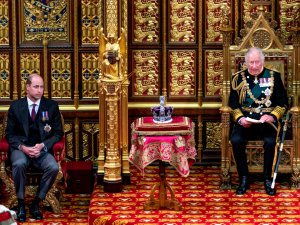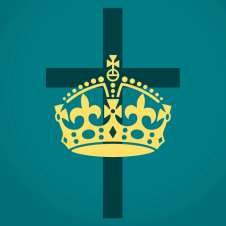The British monarch is required to take on the role of Supreme Governor of the Church of England.
No head of state should promote an official religious preference.
Let's end the ties between our head of state and the Church.
Our head of state, the monarch, holds the title 'Defender of the Faith and Supreme Governor of the Church of England'.
This means the monarch must also be a full member of the Church of England – an anachronism in one of the least religious and most religiously diverse countries in the world.
Despite dwindling congregations, the monarch must also take an oath to maintain the Church of England and to preserve the Church of Scotland.
The position of head of state should not be reserved for members of one particular faith. Most countries allow citizens of any religious affiliation to be head of state. Everyone should be free to follow any personal faith, or none. The monarch is the only person in the country not free to have whatever personal faith they wish or have none at all.
Only 34% of the public think future British monarchs should be required to be members of the Church of England and keep the title of supreme governor of the Church of England.
The ties between the Church and the monarchy are typified by the coronation. The UK is the only democracy to have such an explicitly Christian ceremony for its head of state's accession, with the monarch pledging to maintain the "Laws of God" during an Anglican coronation ceremony in Westminster Abbey. The Church has a key role in the coronation of a new monarch, who is crowned and anointed by the Archbishop of Canterbury. The coronation also has sectarian anti-Catholic overtones. Catholics are explicitly excluded from becoming monarch.
The monarch's declaration of preferential status for one denomination of one religion renders everyone who is not of that religion less than full citizens.
If British monarchs are to continue acting as head of state, they should relinquish the role of head of the Church in order to end the unfair privilege afforded to the Church of England, and show equal regard for citizens of all faiths and none.
Take Action!
1. Write to your MP
While our Head of State is also the head of the established church, we cannot have church-state separation. Ask your MP to support the separation of church and state.
2. Share your story
Tell us why you support this campaign, and how you are personally affected by the issue. You can also let us know if you would like assistance with a particular issue.
3. Join the National Secular Society
Become a member of the National Secular Society today! Together, we can separate religion and state for greater freedom and fairness.
Latest updates
NSS probes future monarchs over gay marriage stance
Posted: Wed, 17 Aug 2022 11:57
The National Secular Society has pressed the future monarchs to confirm their stance on homosexuality after the Church of England affirmed its opposition to gay sex and marriage.
The NSS wrote to the Prince Charles and the Prince William last week to ask if they agree with Archbishop of Canterbury Justin Welby's affirmation of a Church resolution which said same sex marriage was wrong and "homosexual practices" are incompatible with scripture.
The NSS said that as future sovereigns, the Prince of Wales and the Duke of Cambridge will be "oath-bound to maintain and preserve the doctrine and worship of the Church of England".
But it highlighted that Prince William has previously spoken up for the rights of LGBT people.
In 2019 the duke told an LGBT youth charity he would "fully support" his children if they were gay, but would worry about the "discrimination that might come".
The NSS asked whether the duke agreed with the Church's stance and for his message to his "future gay, lesbian and bisexual subjects".
The British monarch, as well as being head of state, also holds the title 'Defender of the Faith and Supreme Governor of the Church of England'. Under current laws, the monarch is required to "join in communion" with the Church of England and take on the role of Supreme Governor, promoting Anglicanism in Britain.
NSS: 'Clear tension between declaring gay sex is a sin and being the established church'
Stephen Evans, chief executive of the NSS, said: "A Sovereign that seeks to act as a focus for national identity, unity and pride cannot, at the same time, be the supreme governor of an officially homophobic institution.
"There is a clear tension between the issuing of declarations that gay sex is a sin and being the established church.
"That tension should be addressed by disestablishing the Church of England and ensuring our head of state has no constitutional entanglement with religion."
The Lambeth Conference
Welby re-affirmed the resolution, known as Lambeth 1.10, during a speech at the Church's 15th Lambeth Conference earlier this month.
The Lambeth Conference is a meeting held every 10 years for Anglican bishops from around the world and is chaired by the Archbishop of Canterbury. This year the conference was attended by more than 650 bishops from 165 countries.
Lambeth 1.10 was originally declared at the 1998 Lambeth Conference.
Welby said: "For the large majority of the Anglican Communion the traditional understanding of marriage is something that is understood, accepted and without question.
"For them, to question this teaching is unthinkable, and in many countries would make the church a victim of derision, contempt and even attack."
Welby's speech has attracted widespread criticism from both within and outside the Church. Broadcaster Sandi Toksvig said in an open letter to Welby that the lives of LGBT+ people are at stake, pointing to higher rates of suicide among LGBT+ young people and the death threats she had received from evangelical Christians.
The Queen sent a message of "warm greetings" to the conference. She said: "As we all emerge from the pandemic, I know that the Conference is taking place at a time of great need for the love of God – both in word and deed."
Image: Copyright House of Lords 2022 / Photography by Annabel Moeller
Just a third of public supports royal ties with CoE, NSS poll finds
Posted: Fri, 4 Jan 2019 07:00
Only a third of the UK public thinks the monarchy's ties to the Church of England should remain intact, according to a poll conducted exclusively for the National Secular Society.
The survey, by Censuswide, revealed that just 34% of people think future British monarchs should keep the title of supreme governor of the Church of England.
Only 34% think future British monarchs should be required to be members of the C of E. Thirty-five per cent think future British monarchs should be required to swear a religious oath to maintain the C of E as the state church.
On all three questions which the pollsters asked more people said they supported change than the status quo.
In response the NSS has called for the laws that bind the monarchy to the Church of England to be scrapped.
The monarch is legally required to be in communion with the Church of England under the 1701 Act of Settlement and to swear three oaths. These involve agreeing to uphold the C of E's privileges, along with agreeing to be a Protestant and to uphold the Presbyterian Church of Scotland.
Catholics are explicitly barred from succeeding to the throne, despite a relatively minor reform in 2013 which removed a bar on those who marry Catholics from the succession. In 2018 Princess Alexandra of Hanover, a member of the royal family of Monaco, lost her place in the British line of succession after becoming a Catholic.
NSS chief executive Stephen Evans said future heads of state should be allowed to make decisions on their religious affiliations for themselves and the ties between church and monarchy should be scrapped.
"With around half the population now having no religious affiliation – and significant numbers belonging to non-Christian faiths – it is no surprise that the public does not generally support laws that bind the monarchy to the Church of England.
"As things stand, when Prince Charles becomes King he will be required to promise to uphold the rights and privileges of the Church of England. In modern Britain no religious beliefs or affiliations should hold privilege or priority over any other. The longstanding laws that bind the monarchy to the Church of England are at odds with modern day Britain's values and should be addressed.
"Allowing heads of state freedom of and from religion would send a strong message that the UK intends to become a more secular, democratic country which respects everyone's freedom of and from religion within an equally-applied law."
In May 2018 the UK's leading research centre on constitutional change, the UCL's Constitution Unit, said religious oaths should be revised or dropped altogether from the UK's next coronation service. The unit called for a "radical reformulation" of the monarch's oaths, with the new oaths focused on the United Kingdom, the constitution and its laws and the monarch's duty to the people.
The unit also said a civil coronation ceremony should be held alongside the traditional Anglican one.
The findings come amid an overall decline in the religiosity of the British public. In September 2018, the British Social Attitudes Survey found that 52% of people were non-religious. Just 14% of people described themselves as Anglicans.
The NSS has campaigned for the disestablishment of the church since its founding in 1866.
In December 2017 the society outlined the case for change in a major report, Separating Church And State: The Case for Disestablishment. The report said the accession of Prince Charles to the throne would be a "particularly opportune moment" to press the benefits of separating church and state.
The government recently dismissed the idea of amending the Coronation Oath Act of 1688 during a debate in the House of Lords. It also said it had made no assessment of the case for the disestablishment of the Church of England.
Censuswide surveyed a representative sample of 2,000 adults across the UK.




